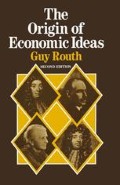Abstract
This is an appropriate point to examine the ideas of Karl Marx (1818–83) and Friedrich Engels (1820–95).1 By the time they began publishing, the soporific doctrines of the popularisers had reached their zenith, while those of the marginalists had not yet begun. Marx and Engels were fond of polarities and contradictions, and this led them to turn other people’s theories upside down. It is a cautionary discovery that many theories are improved by this treatment.
Access this chapter
Tax calculation will be finalised at checkout
Purchases are for personal use only
Preview
Unable to display preview. Download preview PDF.
Notes
Robert Freedman shows what can be done by judicious cutting in his book Marx on Economics (Harmondsworth: Penguin, 1962) in which, by summaries and extracts, he presents a lucid account of Marx’s economics in 251 pages.
The Manifesto of the Communist Party (Peking: Foreign Languages Publishing House, 1965), p. 2.
Ibid. p. 13.
Karl marx, A Contribution to the Critique of Politial Economy, first published in 1859 (Moscow: Progress Publishers, 1970), pp. 20–1.
Karl Marx, The Poverty of Philosophy, 1846–7 (New York: International Publishers, 1963), p. 174. ‘Estates’ in the sense of social classes.
A Contribution to the Critique of Political Economy (1859) (Moscow: Progress Publishers, 1970), p. 23.
Capital (Moscow: Foreign Languages Publishing House, 1961), vol. I, pp. 205–6.
Ibid. p. 209.
Piero Sraffa, Production of Commodities by Means of Commodities: Prelude to a critique of economic theory (Cambridge University Press, 1960).
Georg Wilhelm Friedrich Hegel, The Philosophy of History (1882) (New York: Dover Publications, 1956), p. 9.
D. Ross Gandy, Marx and History (Austin and London: University of Texas Press, 1979), p. 7.
Ibid. p. 6.
Copyright information
© 1989 Guy Routh
About this chapter
Cite this chapter
Routh, G. (1989). The Marxist transformation. In: The Origin of Economic Ideas. Palgrave Macmillan, London. https://doi.org/10.1007/978-1-349-20169-3_4
Download citation
DOI: https://doi.org/10.1007/978-1-349-20169-3_4
Publisher Name: Palgrave Macmillan, London
Print ISBN: 978-0-333-44325-5
Online ISBN: 978-1-349-20169-3
eBook Packages: Palgrave Economics & Finance CollectionEconomics and Finance (R0)

